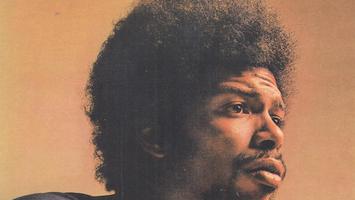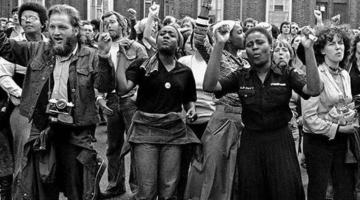How do black workers fare when organizations say they want to attract more minority employees even as they have largely shifted resources away from labor?
“Racial outsourcing occurs when organizations transfer the work of reaching communities of color onto the few black professionals in their employ.”
In this series, we ask acclaimed authors to answer five questions about their book. This week’s featured author is Adia Harvey Wingfield. Wingfield is Professor of Sociology at Washington University in St. Louis. Her book is Flatlining: Race, Work, and Health Care in the New Economy.
Roberto Sirvent: How can your book help BAR readers understand the current political and social climate?
Adia Harvey Wingfield: Flatlining focuses on how economic and cultural changes are affecting black professionals in the workplace. Thus, it highlights the ways that current political and social trends are impacting work and the consequences that this has for black workers in professional environments. Specifically, as organizations have moved towards a neoliberal agenda in which they invest much more in profits and less in labor, this has had consequences for workers, many of which are adverse. Research shows that as workers have lost ground in the modern economy, their financial status has worsened, leaving them more stressed, anxious, and uncertain. At the same time, many organizations and industries now tout their commitment to diversity and their interest in attracting more women and racial minority men as employees. Flatlining considers this paradox and sheds light on the ways that black professional workers navigate this occupational environment.
How do black workers fare when organizations say they want to attract more minority employees even as they have largely shifted resources away from labor? I argue that as organizations say they want more racial diversity even as they adapt neoliberal ideologies that prioritize profits and economic returns, they engage in a process I term “racial outsourcing.” Racial outsourcing occurs when organizations, either explicitly or implicitly, transfer the work of reaching communities of color onto the few black professionals in their employ. As a result, I argue that black professionals do “equity work”—the labor of reshaping organizations to be more welcoming and accommodating to communities of color. Equity work is infrequently acknowledged and almost never compensated, and thus represents a new form of racial workplace inequality in modern organizations.
What do you hope activists and community organizers will take away from reading your book?
My hope is that reading Flatlining will accomplish several outcomes. First, I hope to reflect the work experiences that many black professionals encounter in predominantly white work spaces, and to highlight the challenges that occur in these settings. In the current climate, there are many discussions about the need for and importance of racial diversity, and there are conversations happening about the issues and obstacles that black professionals face. But all too frequently, these conversations center around the still-common experiences that black professionals have with micro (and macro) aggressions at work. This is important, but it isn’t the whole story. Thus, I hope that readers will be exposed to the challenges black professionals encounter, but also think about how these challenges are borne of broader cultural, organizational, and economic changes that reflect larger structural shifts that have taken place over the past half-century.
“Micro (and macro) aggressions at work aren’t the whole story.”
Second, I hope that readers will be compelled to consider what sort of organizational and policy-level changes can help alleviate the issues that black professional workers encounter. A point that I hope readers take away from this book is that part of why equity work presents such a problem is that it represents a case where individual solutions are deployed in an effort to fix a structural problem. The issues black professionals face do not stem from poor behavior from one or two individuals who can be replaced or retrained. The challenges that the doctors, nurses, and technicians in my study encounter are a direct result of organizational and public policies that encourage facilities to cut labor costs, push employees to work longer hours, and to expect employees to “do more with less.” I really hope that those who read Flatlining will be compelled to push organizations and policymakers to think about how these trends actually undermine organizational efforts to create the workforce diversity that they say they want (and need) in the modern economy.
We know readers will learn a lot from your book, but what do you hope readers will un-learn? In other words, is there a particular ideology you’re hoping to dismantle?
If there’s any ideology I hope readers will unlearn, it is that neoliberalism is operating to the benefit of today’s workers. Other scholars such as Victor Chen, Marianne Cooper, Jennifer Silva, and Thomas Piketty have documented quite clearly that the tenets of neoliberalism—prioritizing individual gain, limited state interference in markets, minimizing the social safety net, privatizing public resources and services—may be working well for organizational profits, but they are not serving workers well at all. The current high levels of economic inequality make this point pretty clearly as well. What research has yet to do—and what I hoped to address in writing Flatlining—is to assess how the emergence and embrace of this ideology has had consequences for black professionals, who might seem at face value to be among the winners in this era. After all, in an era of “good” and “bad” jobs, professional work is one of few remaining routes to economic stability, and blacks employed in the health care field work in what is, by all accounts, a growth industry. However, as neoliberalism has shifted the conditions under which work is done, it has also created an environment where organizations shift the difficult work of restructuring organizations to be more attuned to the needs of minority communities over to black workers, leaving them with a significant amount of unacknowledged and unpaid labor.
Who are the intellectual heroes that inspire your work?
I am inspired by many other researchers and academics, probably too many to name, who have laid the groundwork for the type of studies that I aspire to conduct. However, I can say that almost since I first discovered sociology, my intellectual lodestar has been Patricia Hill Collins. I am and probably will always be in awe of her brilliance, courage, and intellectual clarity. Her pioneering work on the importance of understanding how race, gender, class, and other categories are overlapping phenomena fundamentally informed my sociological imagination and has shaped all of my resulting research.
This approach is certainly evident in Flatlining, particularly in my focus on how equity work is shaped by both gender and occupational status. I argue that while I found examples of equity work among the black professionals I interviewed, the particulars of this varied depending on the occupation in which workers were employed, and even within occupational category, equity work differed by gender. This meant that while black doctors did equity work in ways that differed from black nurses (and that nurses too varied from technicians), black women and black men working as physicians had divergent experiences themselves. This argument, and the theoretical framework that shapes it, is a direct outgrowth of Patricia Hill Collins’ legacy in sociology and academia at large.
In what way does your book help us imagine new worlds?
Flatlining helps us to imagine new worlds by pushing the reader to think about how organizations could adopt a different approach that, instead of relying on racial outsourcing and equity work, would require the organization itself to address and resolve these issues. This isn’t an impossibility or a far-fetched consideration. Organizations today are much more receptive to discussions about work-life balance and gender equity than they once were, as scholars and policymakers have been able to shift the conversation to show that companies that take their workers’ needs into consideration can fare far better. The next step is that organizations must consider what this means, and how to do this, when the workers in question are people of color. I argue in Flatlining that, at minimum, this has to include organizations assuming responsibility for acknowledging and addressing the issues that black workers are likely to confront, and to move away from neoliberal thinking that shifts the resolution for and work on these issues back to employees themselves. I expect that organizations that do this successfully will move into a new world that allows them to maximize the potential and opportunities that black workers bring, rather than stifling it.
Roberto Sirvent is Professor of Political and Social Ethics at Hope International University in Fullerton, CA, and an Affiliate Scholar at Yale University’s Interdisciplinary Center for Bioethics, where he directs the Race, Bioethics, and Public Health Project. He is co-author, with fellow BAR contributor Danny Haiphong, of the book, American Exceptionalism and American Innocence: A People’s History of Fake News—From the Revolutionary War to the War on Terror.
COMMENTS?
Please join the conversation on Black Agenda Report's Facebook page at http://facebook.com/blackagendareport
Or, you can comment by emailing us at comments@blackagendareport.com



















